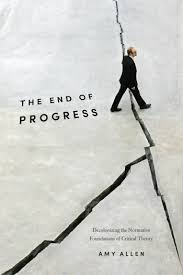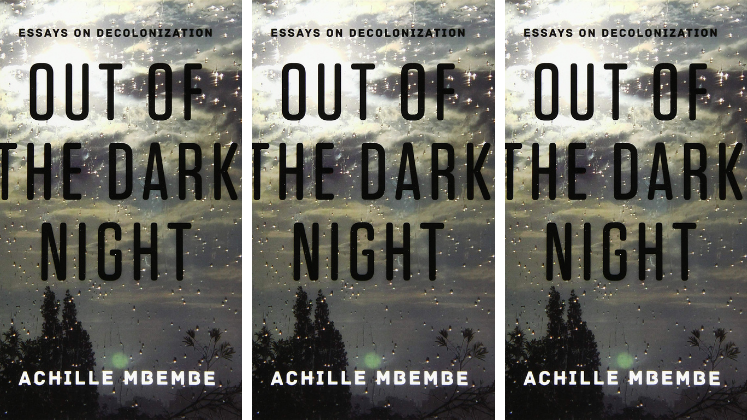In The End of Progress: Decolonizing the Normative Foundations of Critical Theory, Amy Allen challenges the continued reliance on ideas of progress and development found in the work of those such as Jürgen Habermas, Axel Honneth and Rainer Forst, instead seeking to propose a decolonised critical theory. While the book is rigorously argued and compellingly written, Alex Sager questions whether it manages to escape the trappings of the Eurocentrism that it otherwise aims to contest.
The End of Progress: Decolonizing the Normative Foundations of Critical Theory. Amy Allen. Columbia University Press. 2016.
 Political philosophy is undergoing a quiet revolution. The claims of women, LGBTQ communities, racial and ethnic minorities and indigenous groups, along with the legacies of imperialism and colonialism, have challenged abstract, idealised liberalism. Ivy League and Oxbridge vistas with their veils of ignorance and interminable debates about the nature and scope of rights or the proper metric for distributive justice seem increasingly parochial, privileged and unrepresentative.
Political philosophy is undergoing a quiet revolution. The claims of women, LGBTQ communities, racial and ethnic minorities and indigenous groups, along with the legacies of imperialism and colonialism, have challenged abstract, idealised liberalism. Ivy League and Oxbridge vistas with their veils of ignorance and interminable debates about the nature and scope of rights or the proper metric for distributive justice seem increasingly parochial, privileged and unrepresentative.
One might think that critical theorists tempered in Marxism and the horrors of the twentieth century would fare better. Amy Allen’s The End of Progress: Decolonizing the Normative Foundations of Critical Theory demonstrates otherwise. Allen convincingly strikes at the branch of critical theory spearheaded by Jürgen Habermas and represented most prominently by Axel Honneth and Rainer Forst. Nearly 25 years ago, Edward Said condemned critical theorists for their ‘blithe universalism’ and their decision to remain ‘stunningly silent on racist theory, anti-imperialist resistance, and oppositional practice in the empire’. With the notable exception of Thomas McCarthy’s Race, Empire, and the Idea of Human Development, this silence largely continues.
Allen locates the roots of critical theory’s failure to adequately address empire in its commitment to an inherently Eurocentric idea of historical progress. Contained in this is a conception of development inherited from Immanuel Kant, Hegel and Karl Marx that sees progress as an inexorable trajectory toward European modernity. Though contemporary critical theorists insist their philosophy of history is contingent and evitable, they nonetheless fail to extract themselves from this inheritance.
Habermas and Honneth hold that ‘society has followed a certain developmental, unidirectional, cumulative moral-political learning process’ (9) that has culminated in European modernity. Habermas has long sought to provide a universal moral theory as a bulwark against relativism. His theories of communicative action and discourse ethics seek to show how presuppositions embedded in communication and reasoning can be used to ground universal moral claims. Though Habermas tries to derive ethics from the rationality implicit in communication, this rationality is itself a product of social evolution. In particular, Habermas traces the origin of universal values such as human rights, democracy and the ideals of freedom and equality to Europe’s Judeo-Christian heritage (68). Despite their parochial origins, he insists these values have universal scope and deserve allegiance. Though progress and development have contributed to the ugly history of ‘civilising’ other parts of the world, he believes that we can and should disentangle our values from this history.
 Image Credit: (danscape.co CC BY 2.0)
Image Credit: (danscape.co CC BY 2.0)
Honneth in turn sees history’s conflicts as a learning process that has led to notions of freedom and individual self-determination that ground justice. Our participation and active reproduction of the core social institution of modernity serve to justify them. In doing so, we are necessarily committed to viewing the norms we endorse as superior and the historical processes that led to them as progressive. The upshot of Honneth’s account is that the norms of pre- or non-modern peoples who have not benefitted from this history are morally inferior to the norms of European modernity.
In contrast to Habermas and Honneth, Forst eschews a philosophy of history in favour of ahistorical practical reason. He founds justice on a basic human right to justification: people must have rules and institutions justified to them as free and equal members of society. In the political sphere, this transforms into (allegedly) culturally specific notions of political self-determination, autonomy and democracy. Progress is in turn measured against this standard: communities that better approximate these ideals are more advanced. Allen’s objection to Forst is that his reliance on ahistorical reason to justify norms and provide critical grounds for resisting domination and arbitrary rule fails to do justice to how:
conceptions of practical reason and practices or orders of justification can and do serve to entrench, rationalize, and legitimate relations of domination by defining female, queer, and subaltern subjects as irrational or unreasonable (147).
She paraphrases Gayatri Chakravorty Spivak’s observation that ‘domination, when viewed from above, looks an awful lot like equality’ (158).
In response, Allen recommends turning from Habermas, Honneth and Forst to Theodor Adorno and his ‘second son’, Michel Foucault. Adorno and Foucault have a much more ambivalent relationship with progress, reason and the Enlightenment. They insist that Enlightenment ideals cannot be extracted from ‘relations of colonial domination and epistemic violence’ (205), leading Habermas to argue in The Philosophical Discourse of Modernity that their relentless unmasking of the pretensions of Enlightenment reason deprived them of the resources necessary for emancipation and ethical critique.
Allen demurs, contending that Adorno and Foucault’s approach to history is not only critical, but also allows for a modest, contextualist notion of progress, put forward with epistemic humility. Progress for Adorno is conceived in the shadow of Auschwitz and takes the form of an imperative to avoid catastrophe (175), rather than a celebration of the moral achievements of the age. Nonetheless, it gives us something to strive toward. Foucault in turn conceives history in terms of problematising our current point of view. In doing so, we achieve critical distance from our own historically situated perspective and come to understand how power relations have constituted us as subjects. This critical distance enhances our own freedom. Moreover, the admission of our epistemic and moral fallibility, along with the ongoing problematising of our point of view, allows us to engage with people who are different from us in genuine dialogue. Allen sees this modest, critical stance as providing crucial resources for postcolonial theorising.
The End of Progress is rigorously and convincingly argued, and its proposal for a critical theory is in many ways compelling. But despite its many merits, it exemplifies the pitfalls of writing on Eurocentrism from a position of privilege. First, Allen exhibits little interest in dialogue with colonial or postcolonial philosophy, instead seeking to overcome Eurocentrism by focusing almost exclusively on European philosophers. Given the nature of Allen’s project, it is rather surprising to find that she seeks to surmount Eurocentrism through an internal dialogue between European critical theorists.
Second, much of The End of Progress presumes a distinction between the ‘West’ and ‘the rest’. In places, Allen acknowledges that European history cannot be separated from the history of colonisation (115-16). Nonetheless, much of her discussion accepts that Western civilisation enjoys a unique moral heritage that, for better or worse, sets it apart from the rest of the world. Instead, European history and values are better understood as arising with colonial and imperialist projects. People around the world have resisted colonialism, learned the rhetoric of liberalism and responded in kind. It is not that the Enlightenment bypassed non-Europeans: rather, they are keenly aware that Europe’s self-image has blinded its citizens to many of modernity’s aspects and effects.
Third, many of Allen’s criticisms about progress and critical theory have been made by theorists such as Gurminder Bhambra, Dipesh Chakrabarty, Enrique Dussel, Walter Mignolo, Anibal Quijano and Spivak – not to mention Said and Frantz Fanon. Little of what Allen writes will seem particularly novel or controversial to people steeped in this literature. In fairness, Allen cites and discusses these authors, but The End of Progress nonetheless epitomises the asymmetry in which scholars identified with the periphery remain marginalised until an intellectual from the core decides to give their views voice.
Fourth, Allen’s goal of showing that Adorno and Foucault ‘offer important resources within the tradition of critical theory for the crucially important project of decolonizing critical theory’ (201) is odd given that postcolonial authors have already seized on Foucault (especially) and Adorno (to some extent) in their work. This shouldn’t be surprising: intellectuals from regions that do not enjoy dominance need to learn the language of those in power, and Foucault is arguably today’s most influential social theorist.
Finally, it is somewhat mysterious as to why people looking to move beyond Eurocentrism ought to engage with critical theory. Allen starts from the need to decolonise critical theory. Why, though, is this relevant to people interested in overcoming Eurocentrism? Allen’s answer appears to be that she wishes to respond to ‘the charge that postcolonial theory is unable to ground its own critical perspective because it remains mired in irrationalism and relativism’ (230). In other words, critical theory is necessary to save postcolonial theorists from their postmodern unreason. Whatever one makes of this claim – Allen does not develop it in any length in The End of Progress – it is hard to see it as anything other than Eurocentric.
Alex Sager is Associate Professor of Philosophy and University Studies at Portland State University. Follow him on Twitter: @aesager. Read more by Alex Sager.
Note: This review gives the views of the author, and not the position of the LSE Review of Books blog, or of the London School of Economics.






